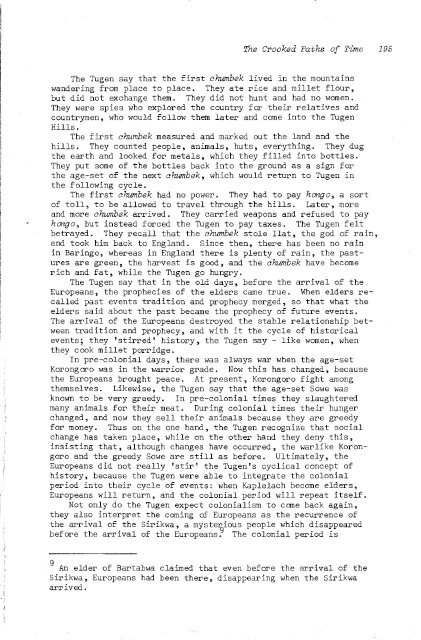Download searchable PDF of Volume 16 1985 - Institute of Social ...
Download searchable PDF of Volume 16 1985 - Institute of Social ...
Download searchable PDF of Volume 16 1985 - Institute of Social ...
You also want an ePaper? Increase the reach of your titles
YUMPU automatically turns print PDFs into web optimized ePapers that Google loves.
The Crooked Paths <strong>of</strong> Time 195<br />
The Tugen say that the first ehumbek lived in the mountains<br />
wandering from place to place. They ate rice and millet flour,<br />
but did not exchange them. They did not hunt and had no women.<br />
They were spies who explored the country far their relatives and<br />
countrymen, who would follow them later and come into the Tugen<br />
Hills.<br />
The first ehumbek measured and marked out the land and the<br />
hills. They counted people, animals, huts, everything. They dug<br />
the earth and looked for metals, which they filled into bottles.<br />
They put some <strong>of</strong> the bottles back into the ground as a for<br />
the age-set <strong>of</strong> the next ehumbek, which would return to Tugen in<br />
the following cycle.<br />
The first ehumbek had no power. They had to pay hango, a sort<br />
<strong>of</strong> toll, to be allowed to travel through the hills. Later, more<br />
and more ehwnbek arrived. carried weapons and refused to pay<br />
hango, but instead forced the Tugen to pay taxes. The Tugen felt<br />
betrayed. They recall that the ehumbek stole Ilat, the god <strong>of</strong> rain,<br />
and took him back to England. Since then, there has been no rain<br />
in Baringo, whereas in England there is plenty <strong>of</strong> rain, the pastures<br />
are green, the harvest is good, and the ehwnbek have become<br />
rich and fat, while the Tugen go hungry.<br />
The Tugen say that in the old days, before the arrival <strong>of</strong> the<br />
Europeans, the prophecies <strong>of</strong> the elders came true. When elders recalled<br />
past events tradition and prophecy merged, so that what the<br />
elders said about the past became the prophecy <strong>of</strong> future events.<br />
The arrival <strong>of</strong> the Europeans destroyed the stable relationship between<br />
tradition and prophecy, and with it the cycle <strong>of</strong> historical<br />
events; they 'stirred' history, the say - like women, when<br />
they cook millet porridge.<br />
In pre-colonial , there was always war when the age-set<br />
Korongaro was in the warrior grade. Now this has changed, because<br />
the brought peace. At present, Korongoro fight among<br />
themselves. Likewise, the Tugen say that the age-set Sowe was<br />
known to be very greedy. In pre-colonial times they slaughtered<br />
many animals for their meat. During colonial times their hunger<br />
changed, and now they sell their animals because they are greedy<br />
for money. Thus on the one hand, the Tugen recognize that social<br />
change has taken place, while on the other hand they deny this,<br />
insisting that, although changes have occurred, the warlike Korongoro<br />
and the greedy Sowe are still as before. Ultimately, the<br />
Europeans did not really 'stir' the Tugen's cyclical concept <strong>of</strong><br />
history, because the Tugen were able to integrate the colonial<br />
period into their cycle <strong>of</strong> events: when Kaplelach become elders,<br />
Europeans will return, and the colonial period will repeat itself.<br />
Not only do the Tugen expect colonialism to came back ,<br />
they also interpret the coming <strong>of</strong> Europeans as the recurrence <strong>of</strong><br />
the arrival <strong>of</strong> the Sirikwa, a mysterious people which disappeared<br />
before the arrival <strong>of</strong> the Europeans: The colonial period is<br />
9 An elder <strong>of</strong> Bartabwa claimed that even before the arrival <strong>of</strong> the<br />
Sirikwa, Europeans had been there, disappearing when the Sirikwa<br />
arrived.
















